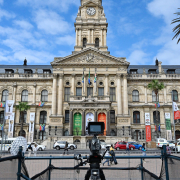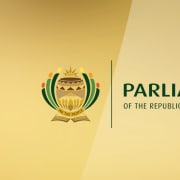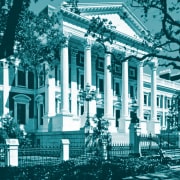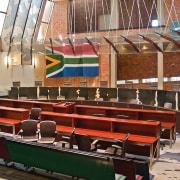|
Getting your Trinity Audio player ready...
|
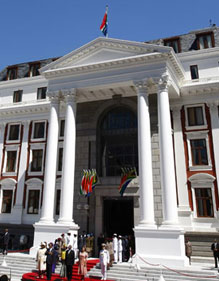 By Valencia Talane
By Valencia Talane
How does Parliament serve you and me as ordinary citizens and why? How do members of Parliament come to sit in its houses? What is their purpose and who do they represent and why? With South Africa heading for its fifth elections since becoming a democracy, we answer these questions and more.
During election season the composition and conduct of South Africa’s government is prominent in the minds of its citizens. The government administration exists to serve the people, and must be answerable to them, said the ruling African National Congress (ANC) in its 1994 election manifesto.
In South Africa, there are three main spheres of government: the executive; the legislature and the judiciary. Specific functions, duties and responsibilities are allocated to these distinct spheres of government, which operate under the separation of powers doctrine. That is, the body that makes the law (the legislature) is different from the body that enforces it (the executive) and from the body that has the power to determine how the law applies in a dispute (the judiciary).
The legislative authority of the national sphere of government is vested in Parliament. The legislative sphere of the provincial government is vested in the provincial legislatures and the local sphere is vested in the municipal councils.
On May 7 South Africans will again get an opportunity to vote for a Parliament they want, by voting for their political party of choice. It will be the fifth Parliament to sit since 1994, the year the current electoral system came into force. With their vote, each citizen will choose the party that they feel best represents their interests and has the best candidates to ensure the job is well done. To assist with this decision, the public is privy to the lists of parliamentary party candidates once these are submitted to the Independent Electoral Commission ahead of elections.
Reminding his colleagues of the crucial task that lay ahead for them, former president Nelson Mandela said to Parliament on his 100th day in office,: “At the end of the day, the yardstick that we shall all be judged by is one and one only: and that is, are we, through our endeavours here, creating the basis to better the lives of all South Africans?
Heart of the country’s management
Parliament is a platform where ministers and heads of state agencies can brag about the achievements of their respective administrative portfolios. It is also where they need to answer for any errors committed and accept the punitive measures that apply to their offence. It is where laws and policies of the country are proposed and their merits and legality debated on, before being passed, shelved for later discussion or discarded within a multi-party representation.
It is also through Parliament that the establishment or disbandment of state institutions is deliberated on, followed by a voting process that takes place in the two houses of Parliament – the National Assembly and the National Council of Provinces.
One such state institution is the office of the public protector, a chapter nine function according to the Constitution.
Public protector Thuli Madonsela’s jurisdiction limits her to investigating public entities within which maladministration and corruption are suspected to have taken place. She then duly advises on how Parliament could pursue retribution that is in the best interest of the public.
It is specifically the speaker of the National Assembly who should declare if there is to be action taken by Parliament in relation to the findings. Consequently, National Assembly speaker Max Sisulu has decided to set up a multi-party Parliamentary committee to look into the findings of a contentious report by Madonsela into the government’s overspending on security upgrades at the private KwaZulu-Natal home of President Jacob Zuma.”
Looking for greater accountability from the government
Political researcher and commentator Judith February asked a vital question in a recent article written for the Institute for Security Studies: How can greater accountability be created in our constitutional democracy?
February’s question is set against the backdrop of a bigger debate: whether or not the country needs a change in its electoral system. The way the system works is that the number of seats a party occupies in Parliament is determined by how many votes it gets in the election. This means each voter consciously elects a group of individuals nominated by the party of their choice, to hold the administration accountable to them on their behalf.
From here on the baton goes to the sitting president – who would occupy office by virtue of his party having received the most seats – to elect his choice of executive to help run the administration. This smaller group, the members of the Cabinet, enjoys an elevated status in relation to their colleagues, and answers to Parliament which in turn represents citizens’ interests.
February recounted recent events as examples in which some of Parliament’s members had displayed sub-standard leadership while dealing with serious national crises affecting South African citizens. One of these was a post-Cabinet media briefing held by mineral affairs minister Edna Molewa in which she spoke on the recent spate of power interruptions across the country.
Molewa said there would be no negative impact as a result of the nationwide blackouts. This, noted February, was a red flag that showed that even though the outages came relatively unexpectedly, the response from government leadership did not exude a sense of urgency or understanding of the effect on citizens and business. Molewa would have us believe no impact on the economy and crucial services would be experienced.
“At the very heart of it all is a lack of accountability by those in power,” wrote February. “This is something that South Africans are becoming all too familiar with when elected representatives are called to account, specifically on decision-making processes or public expenditure.”
In part two of our series we delve deeper into the accountability of elected representatives.


